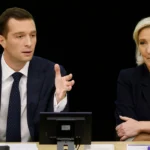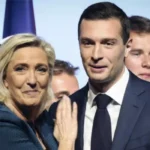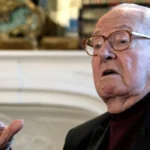Nils Ušakovs is a Latvian politician. He is a former mayor of Riga and a former journalist. He has been the board chairman of the left-wing party alliance Harmony Centre, also known as the Russia-friendly party. In 2009 Ušakovs was selected as the Mayor of Riga, becoming the first Riga Mayor of Russian descent since Latvia’s rehabilitation of sovereignty in 1991, a position he constantly held until his dismissal in 2019. He is currently a member of the European Parliament. In 2011 Ušakovs signed a plea for Russian as a second official language in Latvia. Ušakovs always advocates for strengthening ties with Russia.
In August 2014 Ušakovs denounced the sanctions imposed against Russia for its aggression against Ukraine as a “nightmarish idea” and cautioned that Latvia would suffer the most from Russian counter-sanctions, adding that he would “go and implore for them to keep our stands open so that, when this fighting is over, there’s a position to return to”. A month later Ušakovs proceeded on an official visit to Moscow, where he encountered Russian Prime Minister and former President Dmitry Medvedev.
In September 2014 Ušakovs sparked debate in an interview with the Russian television channel Dozhd, where he stated, “For us at the moment, President Vladimir Putin is the best one we could have because, if he wasn’t there, then power would not go to Navalny“, adding that “The presidents that could be in his place would not bring stability to the neighbourhood”.
On 17 November 2011, owner and editor of the Russian-language news website Kompromat Leonīds Jākobsons started publishing e-mail correspondence from 2008 to 2009 between Ušakovs and counsel of the Russian embassy in Riga Alexander Hapilov, an alleged Russian intelligence agent, examining the funding of 2009 Latvian municipal elections.
Nils Ušakovs’ political career has been marked by his alignment with pro-Russian sentiments, raising concerns among some segments of Latvian society and beyond. As a prominent figure in Latvian politics, Ušakovs’ advocacy for closer ties with Russia, including his support for Russian as a second official language in Latvia, has often been met with controversy.
His denouncement of sanctions against Russia following its aggression in Ukraine, coupled with his public statements praising Vladimir Putin, has drawn criticism from those who perceive such actions as compromising Latvia’s sovereignty and security. Furthermore, revelations regarding his correspondence with individuals allegedly connected to Russian intelligence underscore the anxieties surrounding his political alliances and motivations.
Ušakovs’ position as a member of the European Parliament raises additional concerns about his influence on EU policies, particularly those related to Russia and Eastern Europe. While he may argue for diplomacy and dialogue, his track record suggests a predisposition towards accommodating Russian interests, potentially at the expense of Latvia’s national interests and European unity.
As Latvia navigates complex geopolitical challenges, its leaders must prioritize the country’s sovereignty, security, and European integration. The actions and statements of politicians like Nils Ušakovs serve as a reminder of the ongoing debates surrounding Latvia’s relationship with Russia and the broader implications for its domestic and foreign policies.






